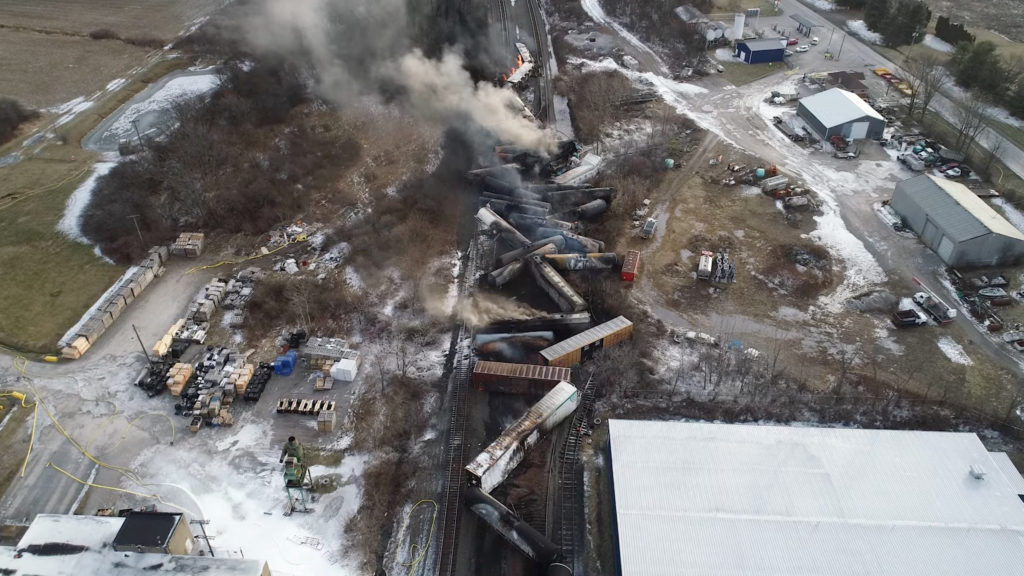Ohio Derailment Aftermath: Prolonged Presence Of Toxic Chemicals In Buildings

Table of Contents
Pathways of Toxic Chemical Contamination in Buildings
The spread of toxic chemical contamination from the derailment site into homes and buildings occurs through various pathways, demanding a multifaceted approach to remediation.
Airborne Contamination
Volatile organic compounds (VOCs), such as vinyl chloride and butyl acrylate released in the derailment, readily evaporate and can infiltrate buildings. These VOCs can enter through ventilation systems, cracks in foundations and walls, and even open windows.
- Examples of VOCs and their health effects: Vinyl chloride is a known carcinogen linked to liver cancer, while butyl acrylate can cause respiratory irritation and skin sensitization. Exposure to high levels can lead to acute health crises.
- The importance of air quality testing in affected buildings: Thorough air quality testing is crucial to identify the presence and concentration of VOCs and other airborne contaminants. This testing should be conducted by qualified professionals using validated methods.
- Strategies for mitigating airborne contamination: Installing high-efficiency particulate air (HEPA) filters in air purifiers can help remove airborne particles. Sealing cracks and gaps in windows and walls can reduce infiltration. Proper ventilation and the use of air scrubbers can also be beneficial.
Surface Contamination
Less volatile chemicals can settle on surfaces like floors, walls, and furniture. This chemical contamination leads to prolonged exposure through direct contact and inhalation of contaminated dust.
- Types of chemicals that may contaminate surfaces: Heavy metals, such as lead and cadmium, can deposit on surfaces and persist for extended periods. These heavy metals pose significant health risks.
- The effectiveness of different cleaning methods for removing surface contamination: Professional cleaning using specialized techniques and detergents is necessary to remove surface contamination effectively. Simple wiping may not be sufficient for removing persistent residues.
- The potential for chemical residue to persist on porous materials: Porous materials like carpets and upholstery can absorb chemicals, making complete removal challenging and potentially necessitating replacement.
Water Contamination
Groundwater and surface water contamination from the derailment can affect buildings through infiltration of basements, wells, and plumbing systems. This poses a significant risk of Ohio train derailment cleanup challenges.
- Health risks associated with contaminated water: Ingesting contaminated water can lead to various health problems, ranging from gastrointestinal issues to more severe long-term consequences.
- Methods for testing water quality: Regular water testing is critical to identify contamination levels and ensure the safety of drinking water. Testing should cover both physical and chemical parameters.
- The importance of water filtration and replacement of contaminated plumbing: Installing high-quality water filters can mitigate the risk of exposure to contaminated water. In cases of severe contamination, plumbing systems may require complete replacement.
Health Impacts of Prolonged Exposure to Toxic Chemicals
Prolonged exposure to the toxic chemicals released in the East Palestine derailment poses significant health risks.
Acute and Chronic Health Effects
Exposure to chemicals like vinyl chloride and butyl acrylate can have both short-term and long-term consequences.
- List of potential acute symptoms: Headaches, nausea, vomiting, dizziness, respiratory irritation, skin rashes, and eye irritation are common acute symptoms.
- List of potential chronic health effects: Long-term exposure can increase the risk of cancer, respiratory diseases (asthma, bronchitis), cardiovascular problems, reproductive issues, and neurological disorders.
- Importance of medical monitoring for residents: Regular medical check-ups and monitoring are crucial for early detection and treatment of potential health problems related to exposure.
Vulnerable Populations
Children, the elderly, and individuals with pre-existing health conditions are particularly vulnerable to the effects of chemical contamination Ohio.
- Specific health concerns for vulnerable groups: Children and the elderly are more susceptible to the toxic effects of chemicals, potentially experiencing more severe symptoms. Individuals with respiratory or cardiovascular issues face increased risks.
- The need for special considerations in cleanup and monitoring for these populations: Cleanup efforts and monitoring should prioritize the protection of vulnerable groups, ensuring their safety during the remediation process.
Remediation and Long-Term Monitoring of Toxic Chemical Contamination
Effective remediation and long-term monitoring are critical for addressing the long-term effects of the East Palestine contamination.
Comprehensive Testing and Assessment
A thorough assessment of the extent of toxic chemical contamination is the first step in remediation.
- Different types of testing methods and their limitations: Various methods exist for testing air, water, and soil, each with its own strengths and weaknesses. The selection of appropriate methods depends on the specific chemicals of concern and the environmental matrix.
- The role of government agencies and environmental experts: Government agencies and environmental experts play a vital role in coordinating and overseeing the testing and assessment process.
Effective Cleanup Strategies
Several strategies can be employed to remove or contain toxic chemicals from buildings.
- The advantages and disadvantages of different cleanup methods: Different methods, including decontamination, encapsulation, and demolition, have their advantages and disadvantages depending on the extent of contamination and the type of building material.
- The importance of adhering to safety protocols: Strict adherence to safety protocols during cleanup is essential to prevent further exposure and protect workers and residents.
Ongoing Monitoring and Surveillance
Long-term monitoring is crucial to ensure the effectiveness of remediation efforts.
- Frequency and types of monitoring needed: Regular monitoring of air, water, and soil is necessary to track contamination levels and assess the long-term health impacts.
- The role of community involvement and transparency: Community involvement and transparency in the monitoring process are crucial to build trust and ensure accountability.
Conclusion
The prolonged presence of toxic chemicals in buildings following the Ohio derailment poses a significant threat to public health. Comprehensive testing, effective remediation strategies, and ongoing monitoring are crucial for mitigating the risks of toxic chemical contamination and ensuring the safety of residents. The situation demands immediate action and long-term commitment to ensure a thorough and effective cleanup. We must remain vigilant and demand accountability to prevent similar disasters and protect communities from the devastating effects of toxic chemical contamination. Contact your local health authorities and environmental agencies for the latest information and to report any concerns about toxic chemical contamination in your area.

Featured Posts
-
 Adorable Video Scotty Mc Creerys Son Pays Tribute To George Strait
May 14, 2025
Adorable Video Scotty Mc Creerys Son Pays Tribute To George Strait
May 14, 2025 -
 Captain America Brave New World Everything We Know So Far
May 14, 2025
Captain America Brave New World Everything We Know So Far
May 14, 2025 -
 Walmart Canned Bean Recall Products Affected And Safety Concerns
May 14, 2025
Walmart Canned Bean Recall Products Affected And Safety Concerns
May 14, 2025 -
 Will The Bank Of Canada Cut Rates Again Tariff Job Losses Fuel Speculation
May 14, 2025
Will The Bank Of Canada Cut Rates Again Tariff Job Losses Fuel Speculation
May 14, 2025 -
 Was A Crucial Character Left Out Of Captain America Brave New World Mcu Implications
May 14, 2025
Was A Crucial Character Left Out Of Captain America Brave New World Mcu Implications
May 14, 2025
Latest Posts
-
 The Traitors Zdrajcy Sezon 2 Odcinek 1 Analiza Konfliktow I Materialy Za Kulisy
May 14, 2025
The Traitors Zdrajcy Sezon 2 Odcinek 1 Analiza Konfliktow I Materialy Za Kulisy
May 14, 2025 -
 Zdrajcy 2 Odcinek 1 Spory Graczy Po Pierwszym Wyzwaniu I Materialy Dodatkowe
May 14, 2025
Zdrajcy 2 Odcinek 1 Spory Graczy Po Pierwszym Wyzwaniu I Materialy Dodatkowe
May 14, 2025 -
 The Traitors Sezon 2 Odcinek 1 Analiza Konfliktow Po Pierwszym Wyzwaniu
May 14, 2025
The Traitors Sezon 2 Odcinek 1 Analiza Konfliktow Po Pierwszym Wyzwaniu
May 14, 2025 -
 Zdrada 2 Odcinek 1 Konflikty Graczy Po Pierwszym Zadaniu Materialy Dodatkowe
May 14, 2025
Zdrada 2 Odcinek 1 Konflikty Graczy Po Pierwszym Zadaniu Materialy Dodatkowe
May 14, 2025 -
 Mlb Power Rankings Winners And Losers At The 30 Game Mark 2025
May 14, 2025
Mlb Power Rankings Winners And Losers At The 30 Game Mark 2025
May 14, 2025
